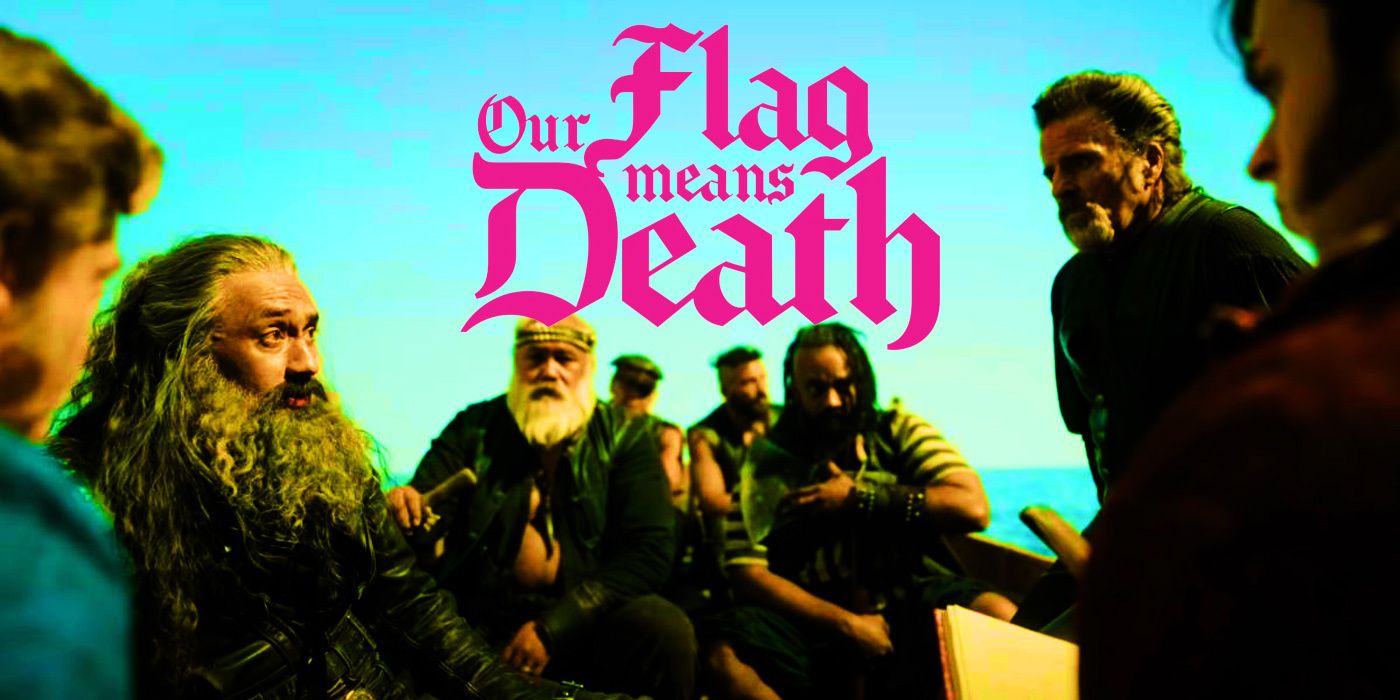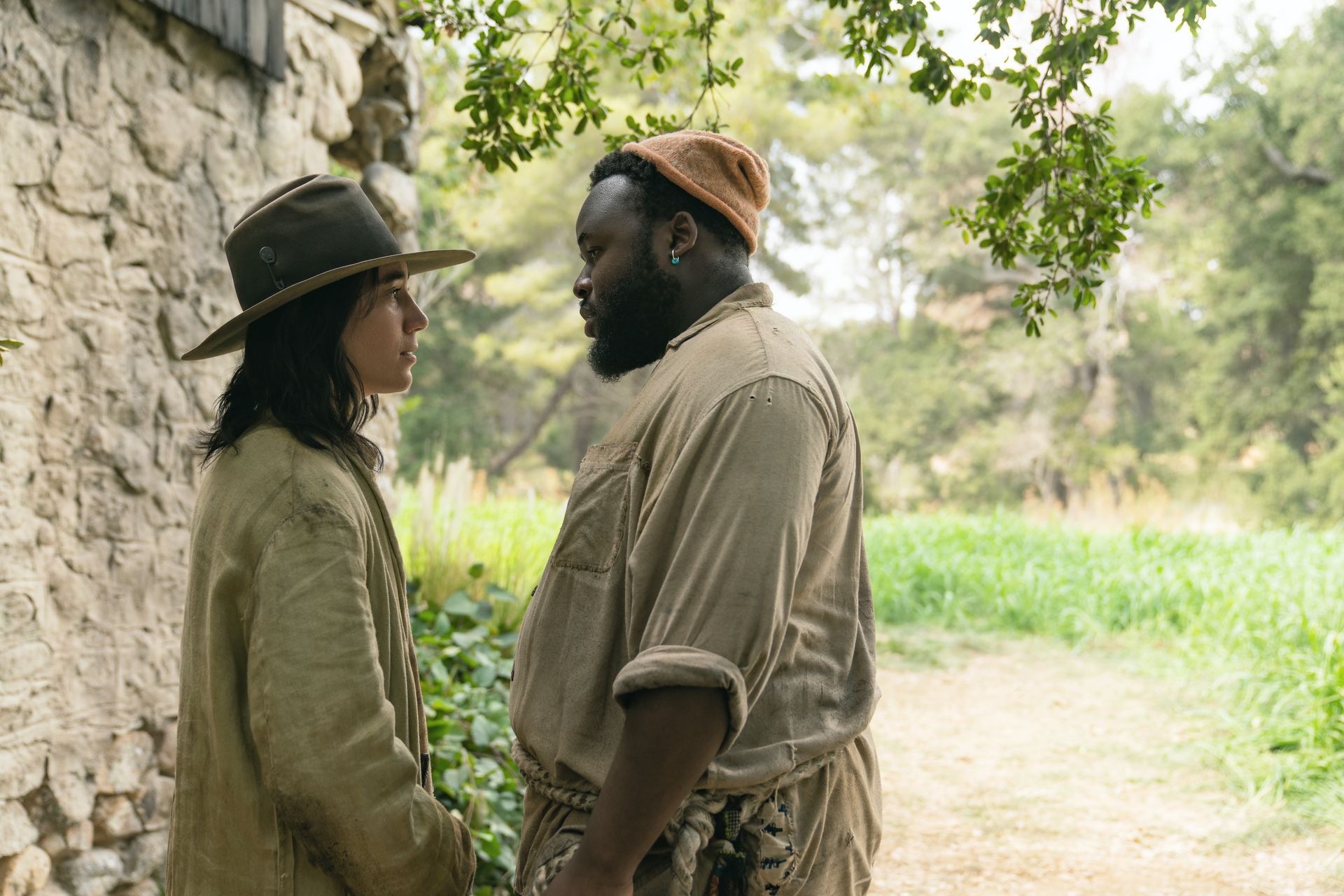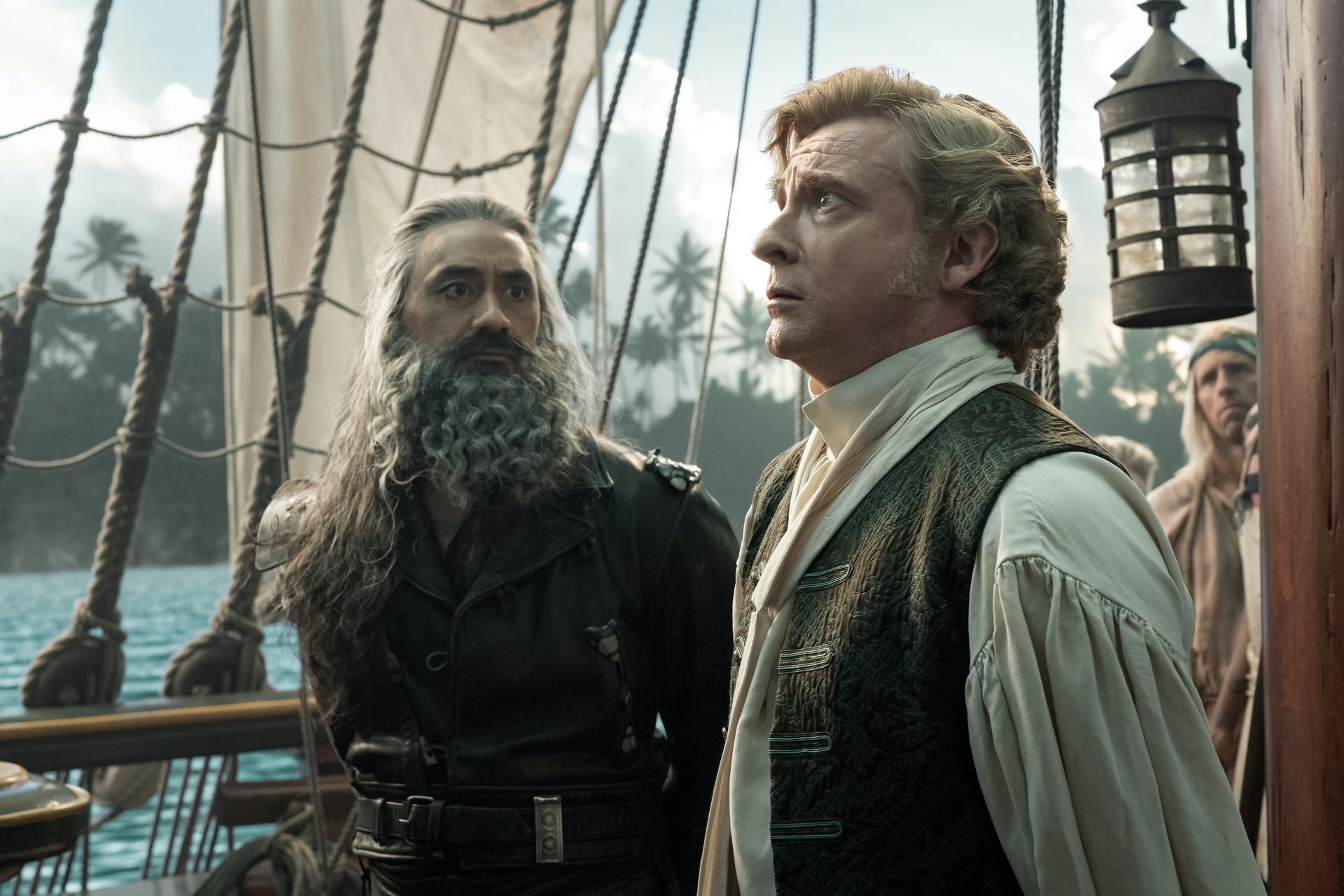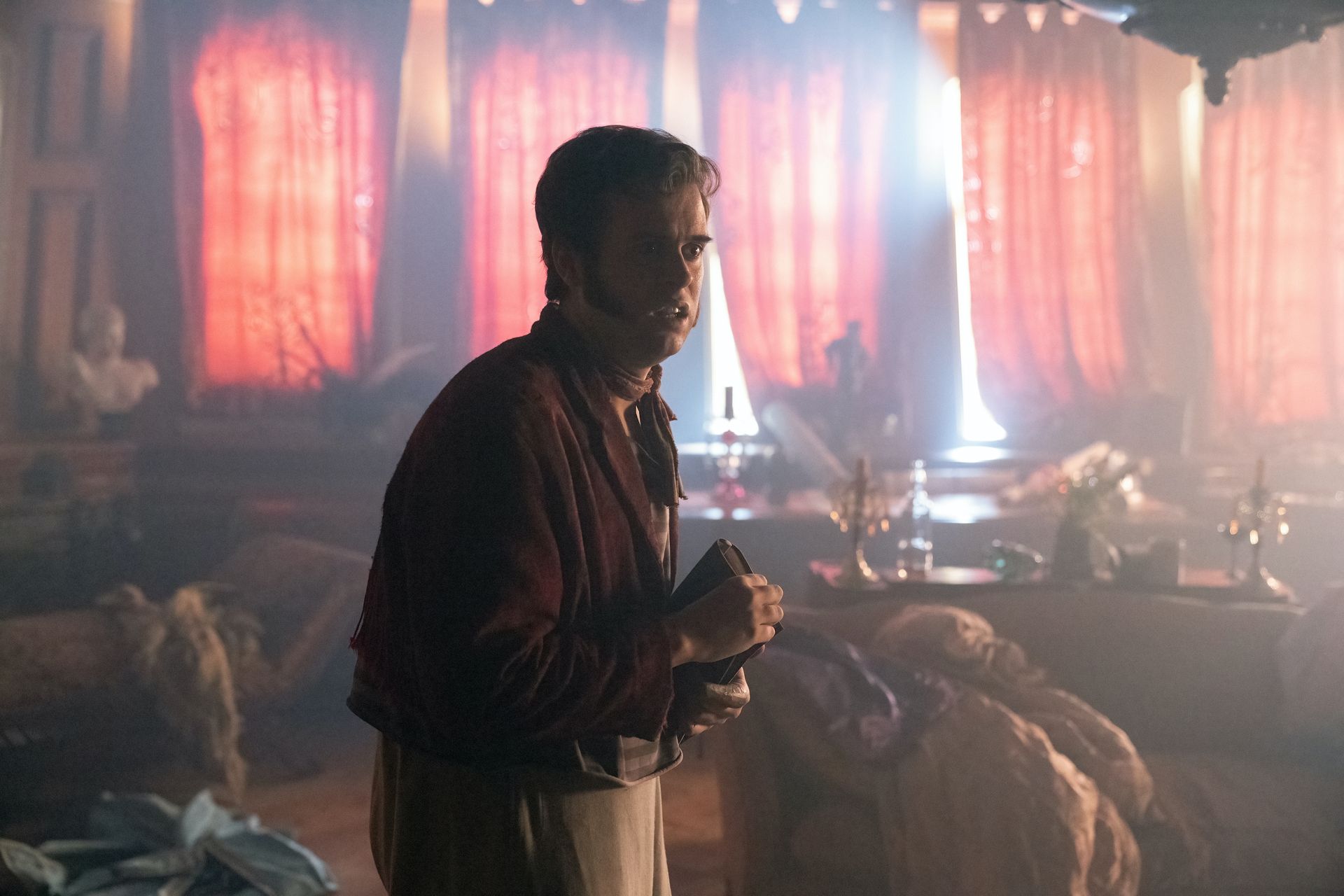Editor's note: The below interview contains major spoilers for Episodes 9 and 10 of Our Flag Means Death.
The HBO Max series Our Flag Means Death, which hails from creator David Jenkins and executive producer Taika Waititi, is (very, very) loosely based on true 18th-century adventures revolves around the hilarious misadventures of self-proclaimed "gentleman pirate" Stede Bonnet (Rhys Darby) and his motley crew of the ship Revenge, who don't necessarily have the greatest faith in their captain as he tries to follow his true dream of becoming a real swashbuckler. As the Revenge's crew begins to become more and more mutinous, their paths fatefully cross with that of the notorious Blackbeard, aka Edward Teach (Waititi) — and from there, the two men forge an unexpected friendship, each learning lessons from the other along the way. The series is executive produced by Waititi, who directs the pilot episodes, as well as Jenkins, Garrett Basch, and Dan Halsted. In addition to Darby and Waititi, Our Flag Means Death's ensemble cast includes Nathan Foad, Samson Kayo, Vico Ortiz, Ewen Bremner, Joel Fry, Matt Maher, Kristian Nairn, Con O’Neill, Guz Khan, David Fane, Rory Kinnear, Samba Schutte, Nat Faxon, Fred Armisen, and Leslie Jones.
Ahead of the season's final two episodes premiering on March 24, Collider had the opportunity to speak with Jenkins about some of the most pivotal moments over the course of "Act of Grace" and "Wherever You Go, There You Are." Over the course of the interview, which you can read below, the Our Flag Means Death creator spoke about following through on the rom-com inspirations he discussed before the season even aired, how he wanted to create more than one romantic attachment forming among the pirates, and how he rewrote the kiss between Stede and Ed multiple times. He also discussed why he wanted to give Mary Bonnet (Claudia O'Doherty) her time to shine in Episode 10, how the scene between Mary and Stede offers a different version of the coming-out narrative, whether he has any ideas he's mulling over for a potential Season 2, and more.
Collider: I know you told me when we first spoke that you were inspired by rom-coms in terms of crafting the series. Little did I know how really true that statement was.
DAVID JENKINS: It's the only reason to make the show. If you didn't do that, it would just be weird. I mean, you're using the rom-com beats. You're using these like they're together. And it's funny because so we're so habituated to be like bromance, bromance, bromance, and it's such a simple move to put them together. I was watching Butch Cassidy and the Sundance Kid on the airplane the other day, and if you add one shot to that movie, that's a romance. That's a non-platonic romance. It's all there.
It's sometimes rare that we see an intimate relationship between two men where the subtext actually becomes text. It's often played for comedy, and there's a little of that in the show, especially early on when they're kind of feeling each other out, Stede and Blackbeard. I'm thinking of that great moment early on where they're stabbing each other, and one of them's trying to pull the sword out of the other, and you hear the noises off-screen, and it's that whole joke of thinking that they're doing something else other than what they're doing.
JENKINS: It's a bit of a Three's Company beat when [Izzy's] hearing it. But the scene was intended to be essentially like a love scene. I mean, one person is penetrating another with an object, and it's a cathartic release and incredibly taboo for both of them. So, in a way, it's a stand-in for a proper sex scene — or a making love scene, probably more accurately. Yeah, and then, to do it metaphorically, but then to actually be literal about it, too, is important.
You could have stopped at just those characters, but then I think of the number of relationships that we get on the show that actually progress into full romances. Oluwande and Jim, Lucius and Black Pete. And aside from the humor, [the show] has these moments of sincerity and human intimacy. Why was important for you to show all of these different romantic attachments that are forming between certain crew members?
JENKINS: I guess I really... I get kind of bored. How much pirate can you do? They're going to rob stuff. They're going to steal ships. There's only so many pirate stories you can do. So if you're going to do a workplace story, I mean, you're essentially having this... You'd have this same amount of relationships in Grey's Anatomy in the ER. So it's standard. It's the most standard. We're making a soap opera on a pirate ship, and to use those soap opera beats... I like it, and I like the flavor in a comedy when you have something that's played genuinely up against very ridiculous things. But a lot of times, people like to diffuse the emotional beats with something really funny, and I don't like to do that. I like it if you just let them land, and you expect it to be diffused, but it just sits with you.
In Episode 9, we get Blackbird and Stede basically agreeing to give up piracy together, which feels like a precursor or hint at what's to come in terms of the two of them, what they're willing to sacrifice for each other.
JENKINS: Yeah, a helpful thing for that was that they did get arrested, basically, and then they did take the Act of Grace. They didn't go to a privateering academy, but they went somewhere that essentially they were going to be privateers, and then Ed double-crossed Stede and stole his ship, and abandoned the crew. We don't know why. So, just taking those facts and then putting them into the arcs that we'd already established is interesting. I don't exactly know why they did this in real life, but let's honor that and see where that takes us. There's the fact that Blackbeard, Edward, does this for Stede. He'd be a privateer with him. He just wants to be with him. And that's quite sweet to me.
Speaking of sweet, I was pleasantly surprised and delighted by the kiss. It doesn't come out of nowhere, because they're sitting having this very vulnerable open conversation with each other, but it almost takes both of them a little by surprise when it happens. In terms of that moment on the page, what did you want to emphasize specifically? And how did Rhys and Taika bring that to life on the day?
JENKINS: They really just honored that scene, and the thing they brought to it is their natural connection and really playing it honestly with each other, and listening to each other, and the way they look at each other, and how tender they are with each other. That scene was hard to write. I rewrote it about a dozen times and shifted beats and cut it, and then re-added stuff. I think... just getting a sense that there was a plan, they had a future. There was a pitch that they should go to China and be pirates there and have a whole different adventure. Which is a little — that's very Butch Cassidy, we're going to go to Bolivia.
Then, to have Stede's past working on him still, and this thing about his family and this obligation and just fear of whatever this is. The thing that dawned on me in writing this is that Stede would have a very immature view of a relationship because he was in an arranged marriage. He's never felt romantic love. And I like that that felt confusing to him, and the penny doesn't drop until the next episode at the end when he is like, "Oh my God, I'm in love." If you've been just put into an arranged marriage, that concept is foreign to you until it actually happens.
I like that Mary's words maybe didn't really register with him at the time that they were spoken. Now, Stede is thinking back on the things that she has said to him and applying them in a new context. It almost brings a different tenor to their relationship that is then strengthened further when he goes home [in Episode 9], and they realize that they're not happy together. But I like that her words become a good motivation for him, as opposed to being someone from his past that he doesn't look back on fondly.
JENKINS: Yeah, that was the problem for me in the story. I knew that I wanted to have the end where he goes home, because you need to give Mary her day in court. I just wanted to know from Mary's perspective what happened and then to see that, yeah, they're friends. They actually like each other and are surprised that they like each other, and it took her being so mad that she was going to kill him to break through. But finally, in doing that, they can connect for the first time in their relationship, genuinely. It's sweet, and it was an unexpected moment to me writing it where it's like, "Oh yeah, they're rooting for each other." That felt nice.
Obviously it happens in the aftermath of a comedic scene where she's trying to kill him, but then it turns into this quiet moment of understanding between the two of them where it feels like they're finally starting to see who the other person really is for the first time. But Mary also isn't even surprised when Stede says that he's in love with Ed. She's just happy for him.
JENKINS: It's so sweet. She just gives him a hug. Just going through the season, I was like, I don't need to see the scene where he is like, "Oh, I have to come out. Oh, I think I might be..." We've seen that scene. It's been done so many times. So what if we don't do that scene? What if it's less about, in a way, the act and the struggle of coming out, and it's more just the act and the struggle of letting yourself love and be loved?
The downside, unfortunately, is because Stede gets waylaid by Chauncey, he can't rendezvous with Ed, and then Ed thinks that he's been stood up. This is where we end up, in the last episode with the tragedy of Ed reverting back to his Blackbeard persona and throwing away everything that reminds him of Stede. That Leonard Cohen song ["Avalanche"] — was that always the choice in that scene, or were there other song choices that were considered?
JENKINS: There were, and I can't remember. Maggie Phillips is just an incredible music supervisor and will come at you with a dozen great choices. And then, if none of those work, she'll come at you with another dozen. That was perfect for me. I really like in [Hunt for the] Wilderpeople, there's a Leonard Cohen track that's really awesome. I've always loved that specific track, and I loved this track. It's very austere. I like things that have a slight spaghetti Western sound to them. "The Chain" has a spaghetti Western sound to it if you listen to it, and I like mixing those quasi-Western beats with pirates. So yeah, there was something about that song. It's so dramatic, and it's also very dry, and it's scary. It's a scary song when you put it with those images. It's like, "Oh man, this guy's a loose cannon. Shit."
Along those lines, I have to ask, is this the last we've seen of Nathan Foad? Is Lucius really dead?
JENKINS: You got to wait.
If there is a Season 2, and I'm sure you probably cannot speak to this at this current point, are there any stories that you're mulling over for how the story's going to continue?
JENKINS: Even writing the finale, you automatically start thinking about the next season. There's nothing I want to discuss because I don't want to commit to anything that doesn't end up in the script, or spoil anything that is really cool. But it's really great to have this division happen, and when these people run into each other again, who are they going to be? That, to me, is the most interesting question to start from.
All episodes of Our Flag Means Death are currently available to stream on HBO Max.




